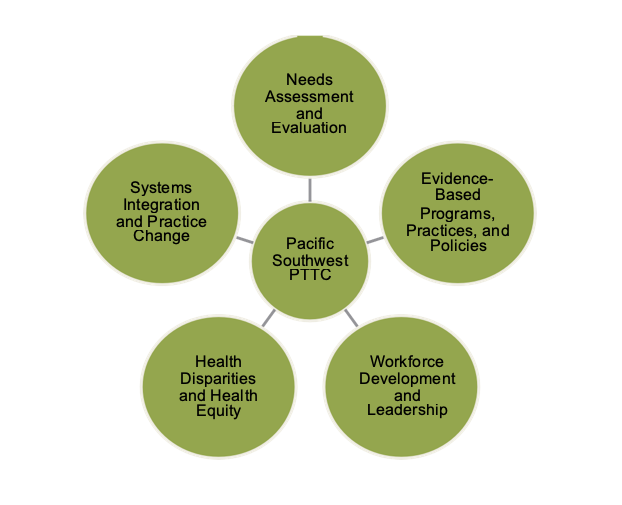Home > Advisory Board and Workgroups
Funded by the Substance Abuse and Mental Health Services Administration (SAMHSA), Prevention Technology Transfer Centers (PTTC) develop and disseminate prevention tools and strategies needed to reduce substance misuse. The Pacific Southwest PTTC is administered by CASAT at the University of Nevada, Reno and serves Health and Human Services Region 9.
Our primary goal is to advance the ability of the Region 9 substance misuse prevention workforce to find, select, implement, and evaluate evidence- based and promising substance misuse prevention programs, policies, and practices to achieve a meaningful reduction in substance misuse and its harmful consequences. The Pacific Southwest PTTC delivers training and technical assistance (T/TA) and disseminates learning resources to the substance misuse prevention workforce to improve their application of prevention science.
REGION 9: THE PACIFIC SOUTHWEST
The Pacific Southwest PTTC will serve HHS Region 9: American Samoa, Arizona, California, Federated States of Micronesia, Guam, Hawaii, Nevada, Northern Mariana Islands, Republic of the Marshall Islands, and Republic of Palau.
A regional Advisory Board will advise and guide our work. The Pacific Southwest PTTC Advisory Board is comprised of state/jurisdiction and community-level prevention professionals. This group will aid in building and maintaining collaborative regional relationships; advise the PTTC on T/TA needs, regional priorities, and delivery methods; and provide input and feedback on the development of PTTC regional services, tools, and resources. The Advisory Board will meet at least twice per year. Advisory Board members include:
American Samoa
Tu’umafua Maiava
American Samoa Dept. of Human and Social Services
Muaiavaona Fofoga Pila
Maoputasi Drug Free Coalition
Arizona
Gabrielle Richard
Arizona Health Care Cost Containment System
Julie Craig
Arizona Youth Partnership
California
Thomas Renfree
County Behavioral Health Directors Association
Joe Eberstein
San Diego County Marijuana Prevention Initiative
Commonwealth of the Northern Mariana Islands
Reyna Saures
Community Guidance Center, Inc.
James Arriola
Brabu Behavioral Health Services
Federated States of Micronesia
Benido Victor
Health and Social Affairs - National Government
Hilda Tafledep
State of Yap, Behavioral Health & Wellness
Guam
Theresa Arriola
Guam Behavioral Health Services
Juanita Blaz
Island Girl Power, Inc.
Hawaii
John Valera
State of Hawaii, Alcohol and Drug Abuse Division
Michelle Park
Coalition for a Drug-Free Hawaii
Nevada
Tracy Palmer
Division of Public and Behavioral Health
Linda Lang
Nevada Statewide Coalition
Republic of the Marshall Islands
Julia Alfred
Ministry of Health
Ninida Note
College of the Marshall Islands
Republic of Palau
Everlynn Temengil
Division of Behavioral Health Services, Ministry of Health
Elenita Brel
Palau Behavioral Health Advisory Council
Additionally, five topic-based workgroups will take a more focused approach. The Pacific Southwest PTTC workgroups will act as strategic thought partners on specific topic areas that we identified as critical to developing and sustaining substance misuse prevention infrastructure and outcomes at local, state, and regional levels. The topic areas were identified through conversations with various prevention leaders across the region. All workgroups are
comprised of state/jurisdiction and community-level prevention professionals and at least one Advisory Board representative. The workgroup topic areas are:

The Needs Assessment and Evaluation workgroup will focus on services and resources designed to strengthen communities’ abilities to collect, report, and use data in their prevention work, including conducting a thorough needs assessment, using needs assessment data to select evidence-based interventions, and evaluating processes and outcomes.
The Evidence-based Practices, Programs, and Policies workgroup will support the development of T/TA services and resources to increase prevention practitioners’ understanding of what constitutes evidence of effectiveness and increase their ability to identify potential evidence-based interventions, select “best fit” set of interventions for their community, and balance fidelity with any necessary adaptations when implementing selected interventions.
The Workforce Development and Leadership workgroup will aid in the development of T/TA services and resources designed to build the skills of prevention practitioners to apply prevention science to their work, implement all aspects of prevention, and increase leadership skills across the region.
The Health Disparities and Health Equity workgroup will advise on ways to build the capacity of prevention practitioners to identify health disparities, as well as the contributing factors that lead to those health disparities, and to apply effective strategies to increase health equity in their communities.
The Systems Integration and Practice Change workgroup will provide feedback on T/TA services and resources to build prevention practitioners’ knowledge and skills to increase the integration of primary prevention into other health-related settings, such as primary care or community health agencies. In addition, this group will focus on how the PTTC can build practitioners’ abilities to create or strengthen systems that support changes in prevention practice to increase the effectiveness of prevention across multiple settings.
Each workgroup will be responsible for the following tasks:
The workgroups will determine the frequency of their meetings, as well as their structure and function in order to address the tasks outlined above.